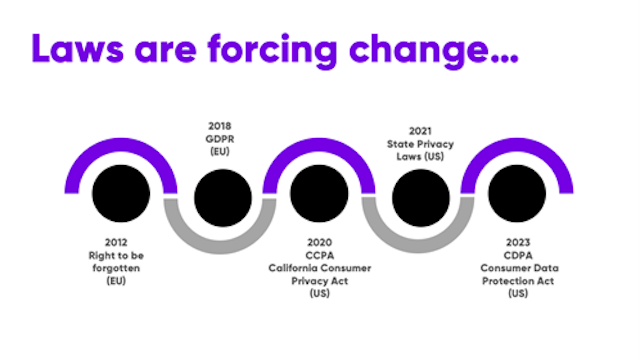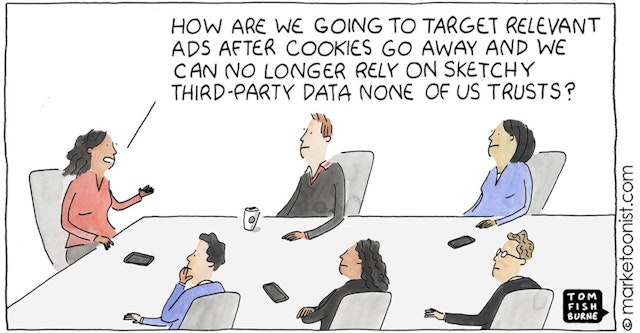Google cookie cull: how we can all approach data differently
At the start of 2020, Google announced that it was removing third-party cookies from Chrome by 2022. It promised to use those two years to develop a private alternative that users and advertisers (including Google) would be happy with.

Google have made further announcements and have planned to phase out third-party cookies in Chrome
Google has rolled out some attempts since then, most notably the Federated Learning of Cohorts (FLoC). This initiative is a type of web tracking through federated learning. It groups people into ‘cohorts’ based on their browsing history for the purpose of interest-based advertising.
Of late, Google has made further announcements and plans to phase out third-party cookies in Chrome over a three-month period ending towards the end of 2023.
As new privacy laws are introduced year after year, we look at the benefits of eradicating cookies, the effect it will have on advertisers and how all this will redefine the use of data for engagement and targeting.
The good
Privacy and the way we use data has been at the forefront of the digital space for decades. From the GDPR release in 2018 to current state privacy laws, advertising platforms such as Facebook and Google have been forced to abide by the rules. However, it has not always been a straightforward process putting this into practice.
For consumers, Google has said it’s not going to replace tracking cookies with anything of its own, this should provide more privacy for end users as it prevents their movement around the web being tracked.
However, Google has said that it will provide API (a connection between two computer programs) options instead that will deliver privacy focused tracking first allowing advertisers to be able to hit the same targets as before.
Third-party cookies may have rattled advertisers, but first-party cookies aren’t going anywhere. As an advertiser, you’ll still be able to capture data on customers visiting your own site as you’ve always been able to. This will preserve things like login data and help provide a better experience for customers.

With fewer tracking options available to advertisers, they will have to improve their current options, rather than just relying on dynamic product ads and highly targeted ads. The content and product will both have to be of higher quality.
When it comes to redefining data usage, the loss of third-party cookies means paid-for advertising could potentially decline in terms of effectiveness. Data-driven advertising goes beyond this “ready, aim, fire” mentality with higher levels of targeting, personalization, placement, and timing.
The bad
With the loss of cookies, advertising platforms that fall outside of Google are going to have to come up with an alternative method to track. At this time, very few have said how they’re going to do this and how privacy focused they will be going forward.
Many advertisers are predicting cost increases of up to 25% to hit their current marketing goals (although with no solutions available, including Google’s, this remains to be seen).

The ugly
Cookies, although not privacy focused, were transparent in their nature, any user could block or remove cookies and they had an obvious purpose. Without cookies as an option, users may be forced into more black box options such as Google’s API and other third-party methods that long term, may be worse for privacy.
Despite working towards improving privacy laws, eradicating third-party cookies is going to give Google an even bigger monopoly of the ads market. Google will have solutions available on day one that will more than likely work as effectively as before. The same cannot be said for others, if advertisers can’t get the same results from third parties, then they will flock back to Google.
How can we adopt a new approach to data?
We all need to redefine the way in which we use data, particularly when it comes to engagement, retargeting and the purchasing funnel. Instead of casting a wide net to encourage and attract new users, use your internal data to streamline your funnel. Make sure you have good quality data and target users in your database who have opted in, optimizing each stage of the funnel, making them more likely to convert.
There are several brands who are on the front foot and have changed their approach to data, using the data they already have to make better, data-driven decisions.
Vodafone has revealed that it is becoming less reliant on third-party cookies and is utilizing the data it already has for its omnichannel strategy. Using its internal data ensures that it is compliant, and its messaging remains consistent across all channels.
Netflix is the market leader in using first-party data to make marketing and strategy decisions. Utilizing internal data enables effective A/B testing and as a result, has built its recommendation engine which gives users show and film recommendations based on their watch history.
Privacy laws and the removal of third-party cookies is proving the importance of data usage and obtaining the right permissions from users. Third-party cookies may be gone but first-party data remains, and the focus will now shift to personalization and effectiveness at all stages of the purchasing funnel, not just awareness.
BOSCO™ Connect combines all your digital marketing data with extensive algorithmic modelling to create personalized reporting dashboards. The standardized interface provides a single source of truth and enables marketers to make better digital marketing spend decisions using data driven insights. Find out more about BOSCO™ Connect.
Content created with:

BOSCO™
The Digital Marketing Prediction Index - Spend your marketing budget efficiently and with certainty.
Find out more